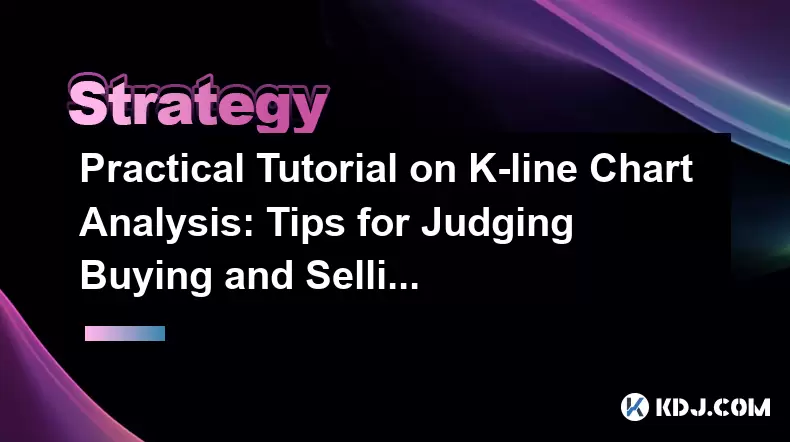-
 bitcoin
bitcoin $87959.907984 USD
1.34% -
 ethereum
ethereum $2920.497338 USD
3.04% -
 tether
tether $0.999775 USD
0.00% -
 xrp
xrp $2.237324 USD
8.12% -
 bnb
bnb $860.243768 USD
0.90% -
 solana
solana $138.089498 USD
5.43% -
 usd-coin
usd-coin $0.999807 USD
0.01% -
 tron
tron $0.272801 USD
-1.53% -
 dogecoin
dogecoin $0.150904 USD
2.96% -
 cardano
cardano $0.421635 USD
1.97% -
 hyperliquid
hyperliquid $32.152445 USD
2.23% -
 bitcoin-cash
bitcoin-cash $533.301069 USD
-1.94% -
 chainlink
chainlink $12.953417 USD
2.68% -
 unus-sed-leo
unus-sed-leo $9.535951 USD
0.73% -
 zcash
zcash $521.483386 USD
-2.87%
Practical Tutorial on K-line Chart Analysis: Tips for Judging Buying and Selling Points in the Crypto Market
K-line charts are essential in crypto trading for visualizing price action through candlestick patterns, helping traders identify trends, reversals, and optimal entry or exit points.
Jun 12, 2025 at 07:14 am

Understanding the Basics of K-line Charts in Cryptocurrency Trading
K-line charts, also known as candlestick charts, are one of the most widely used tools for analyzing price movements in the cryptocurrency market. Originating from Japan, these charts provide a visual representation of price action over specific time intervals, displaying open, high, low, and close (OHLC) values.
Each candlestick consists of a body and shadows (or wicks). The body represents the range between the opening and closing prices. If the closing price is higher than the opening, the candle is typically green or hollow; if lower, it's red or filled. The shadows indicate the highest and lowest prices reached during that period.
In the crypto market, understanding how to read K-line charts is crucial for identifying potential buying and selling points. Traders use patterns formed by multiple candlesticks to anticipate future price movements and make informed decisions.
Identifying Key Reversal Patterns on K-line Charts
Reversal patterns signal that a prevailing trend may be about to change direction. Recognizing these patterns can help traders spot potential turning points in the market.
- Hammer: A single candle with a small body at the top and a long lower shadow indicates a possible bullish reversal.
- Shooting Star: The opposite of the hammer, this pattern has a small body at the bottom and a long upper shadow, suggesting a bearish reversal.
- Engulfing Pattern: When a large candle completely engulfs the previous smaller candle, it signals strong momentum in the new direction — bullish engulfing if up, bearish engulfing if down.
- Morning Star & Evening Star: These three-candle patterns are reliable indicators of reversals. The morning star suggests a shift from downtrend to uptrend, while the evening star does the opposite.
Traders should not rely solely on these patterns but combine them with volume analysis and other technical indicators like RSI or MACD to increase accuracy.
Recognizing Continuation Patterns for Trend Confirmation
While reversal patterns suggest a change in direction, continuation patterns imply that the current trend will likely persist after a brief consolidation.
- Doji: A candle with nearly equal open and close prices, often signaling indecision in the market.
- Spinning Top: Similar to a doji but with slightly larger bodies, indicating a pause in the trend.
- Three White Soldiers and Three Black Crows: These multi-candle patterns confirm the continuation of bullish or bearish trends respectively.
These patterns are especially useful when they appear within a well-established trend. For example, seeing a three white soldiers pattern during an uptrend can serve as a confirmation signal to hold or enter long positions.
Volume plays a critical role here — higher volume during continuation patterns strengthens their reliability.
Using Support and Resistance Levels with K-line Charts
Support and resistance levels are key areas where the price has historically struggled to move beyond. Integrating these levels with K-line chart patterns can significantly enhance trade timing.
When a hammer or bullish engulfing candle forms near a support level, it could indicate a strong buying opportunity. Conversely, a shooting star or bearish engulfing candle appearing near resistance might be a sell signal.
To effectively apply this strategy:
- Identify clear historical support and resistance zones using horizontal lines or moving averages.
- Look for confluence between price action and candlestick patterns at these levels.
- Wait for confirmation candles before entering trades to avoid false breakouts.
For instance, if Bitcoin approaches $60,000 and a morning star pattern forms at that level, it reinforces the likelihood of a bounce.
Combining K-line Analysis with Volume Indicators
Volume is a powerful tool that confirms the strength behind candlestick patterns. A candlestick pattern without significant volume may be misleading.
A bullish engulfing candle followed by high volume increases the probability of an upward move. On the contrary, a doji forming with declining volume might suggest weak market interest.
To incorporate volume into your K-line analysis:
- Use the Volume by Price (VBP) indicator to see where the most trading activity occurred.
- Observe volume spikes during engulfing or reversal patterns — these often validate the authenticity of the signal.
- Watch for volume divergence — if price is rising but volume is falling, it may signal weakening momentum.
This combination allows traders to filter out weaker signals and focus on more robust opportunities.
Frequently Asked Questions (FAQ)
Q: Can I rely solely on K-line charts for trading decisions?While K-line charts are powerful, they work best when combined with other tools such as moving averages, RSI, and volume indicators. Sole reliance on candlestick patterns can lead to false signals.
Q: What time frame is best for K-line chart analysis in crypto trading?The choice depends on your trading style. Day traders may prefer 5-minute or 15-minute charts, while swing traders might use 4-hour or daily charts. Always align the time frame with your strategy.
Q: How do I differentiate between real and fake candlestick patterns?Real patterns usually form at key support/resistance levels and are confirmed by volume. Fake patterns often occur in sideways markets or during low liquidity periods. Use confluence with other indicators to verify.
Q: Do K-line patterns work the same across all cryptocurrencies?Most patterns are universal, but some altcoins with low liquidity or high volatility may produce less reliable signals. Stick to major pairs like BTC/USDT or ETH/USDT for better accuracy.
Disclaimer:info@kdj.com
The information provided is not trading advice. kdj.com does not assume any responsibility for any investments made based on the information provided in this article. Cryptocurrencies are highly volatile and it is highly recommended that you invest with caution after thorough research!
If you believe that the content used on this website infringes your copyright, please contact us immediately (info@kdj.com) and we will delete it promptly.
- Bitcoin's Rocky Road: Inflation Surges, Rate Cut Hopes Fade, and the Digital Gold Debate Heats Up
- 2026-02-01 09:40:02
- Bitcoin Shows Cheaper Data Signals, Analysts Eyeing Gold Rotation
- 2026-02-01 07:40:02
- Bitcoin's Latest Tumble: Is This the Ultimate 'Buy the Dip' Signal for Crypto?
- 2026-02-01 07:35:01
- Big Apple Crypto Blues: Bitcoin and Ethereum Stumble as $500 Billion Vanishes Amid Macroeconomic Whirlwind
- 2026-02-01 07:35:01
- Michael Wrubel Crowns IPO Genie as the Next Big Presale: A New Era for Early-Stage Investments Hits the Blockchain
- 2026-02-01 07:30:02
- XRP, Ripple, Support Level: Navigating the Urban Jungle of Crypto Volatility
- 2026-02-01 06:35:01
Related knowledge

How to Develop a Crypto Exit Strategy to Secure Your Profits?
Jan 22,2026 at 10:19am
Understanding Market Cycles and Timing1. Cryptocurrency markets operate in distinct phases: accumulation, markup, distribution, and markdown. Recogniz...

How to Find and Invest in Promising DePIN Crypto Projects?
Jan 19,2026 at 06:19pm
Understanding DePIN Fundamentals1. DePIN stands for Decentralized Physical Infrastructure Networks, combining real-world hardware deployment with bloc...

How to Find Liquidity Pools with the Lowest Impermanent Loss Risk?
Jan 25,2026 at 05:59pm
Fundamental Characteristics of Low-Risk Liquidity Pools1. Stablecoin pairs dominate the lowest impermanent loss environments due to minimal price dive...

How to Analyze Market Sentiment Using the Crypto Fear & Greed Index?
Jan 24,2026 at 09:39am
Understanding the Crypto Fear & Greed Index1. The Crypto Fear & Greed Index is a composite metric that aggregates data from multiple sources including...

How to Hedge Your Crypto Portfolio Against a Market Crash?
Jan 19,2026 at 03:40pm
Risk Assessment and Portfolio Allocation1. Determine the total exposure to high-volatility assets such as memecoins or newly launched tokens without a...

How to Use Technical Analysis for Short-Term Bitcoin Trades?
Jan 25,2026 at 01:00pm
Understanding Candlestick Patterns1. Bullish engulfing formations often appear after a sustained downtrend and signal potential reversal points where ...

How to Develop a Crypto Exit Strategy to Secure Your Profits?
Jan 22,2026 at 10:19am
Understanding Market Cycles and Timing1. Cryptocurrency markets operate in distinct phases: accumulation, markup, distribution, and markdown. Recogniz...

How to Find and Invest in Promising DePIN Crypto Projects?
Jan 19,2026 at 06:19pm
Understanding DePIN Fundamentals1. DePIN stands for Decentralized Physical Infrastructure Networks, combining real-world hardware deployment with bloc...

How to Find Liquidity Pools with the Lowest Impermanent Loss Risk?
Jan 25,2026 at 05:59pm
Fundamental Characteristics of Low-Risk Liquidity Pools1. Stablecoin pairs dominate the lowest impermanent loss environments due to minimal price dive...

How to Analyze Market Sentiment Using the Crypto Fear & Greed Index?
Jan 24,2026 at 09:39am
Understanding the Crypto Fear & Greed Index1. The Crypto Fear & Greed Index is a composite metric that aggregates data from multiple sources including...

How to Hedge Your Crypto Portfolio Against a Market Crash?
Jan 19,2026 at 03:40pm
Risk Assessment and Portfolio Allocation1. Determine the total exposure to high-volatility assets such as memecoins or newly launched tokens without a...

How to Use Technical Analysis for Short-Term Bitcoin Trades?
Jan 25,2026 at 01:00pm
Understanding Candlestick Patterns1. Bullish engulfing formations often appear after a sustained downtrend and signal potential reversal points where ...
See all articles





















![THIS IS THE HARDEST COIN TO GET [POLY DASH] THIS IS THE HARDEST COIN TO GET [POLY DASH]](/uploads/2026/01/31/cryptocurrencies-news/videos/origin_697e0319ee56d_image_500_375.webp)




















































